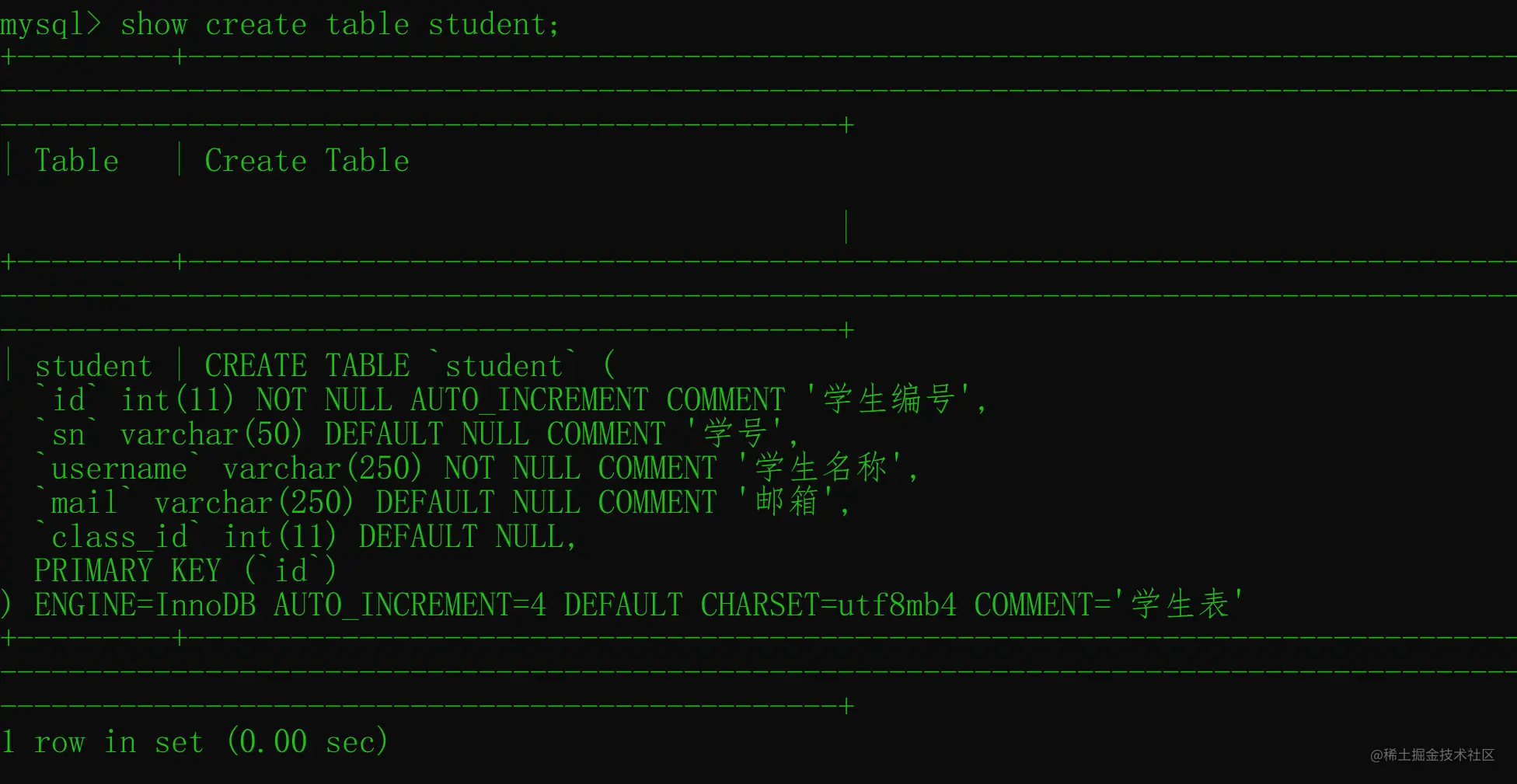How to query field comments in MySQL? Check out and compare 5 methods!
How to query field comments in MySQL? The following article will review and compare 5 methods for querying MySQL field comments, and introduce how to modify table comments and field comments. I hope it will be helpful to you.

In many scenarios, we need to view table comments in MySQL, or comments on all fields under a certain table, so this article will inventory and compare several query comments. way. [Related recommendations: mysql video tutorial]
Create a test database
Before we start, let’s create a database for the following demonstration.
-- 如果存在就先删除数据库 drop database if exists test2022; -- 创建数据库 create database test2022; -- 切换数据库 use test2022; -- 创建表和字段(以及相应的注释) CREATE TABLE `student` ( `id` int(11) NOT NULL AUTO_INCREMENT COMMENT '学生编号', `sn` varchar(50) DEFAULT NULL COMMENT '学号', `username` varchar(250) NOT NULL COMMENT '学生名称', `mail` varchar(250) DEFAULT NULL COMMENT '邮箱', `class_id` int(11) DEFAULT NULL, PRIMARY KEY (`id`) ) comment='学生表' ENGINE=InnoDB AUTO_INCREMENT=4 DEFAULT CHARSET=utf8mb4
Query all table comments
Use the following SQL to query the comments of all tables under a database:
SELECT table_name 表名, table_comment 表说明 FROM information_schema.TABLES WHERE table_schema='数据库名' ORDER BY table_name
Case: Query the comments of all tables in the test2022 database:
SELECT table_name 表名, table_comment 表说明 FROM information_schema.TABLES WHERE table_schema='test2022' ORDER BY table_name
The execution result is shown in the figure below:

Query all field comments
Field comment query method 1
The query syntax is as follows:
show full columns from 表名;
Case: Query the comment information of all fields in the student table:
show full columns from student;
The execution results are as shown in the figure below:

Field comment query method 2
The query syntax is as follows:
select COLUMN_NAME 字段名,column_comment 字段说明,column_type 字段类型, column_key 约束 from information_schema.columns where table_schema='数据库名' and table_name='表名';
Case: Query the comment information of all fields in the student table:
select COLUMN_NAME 字段名,column_comment 字段说明,column_type 字段类型, column_key 约束 from information_schema.columns where table_schema='test2022' and table_name='student';
The execution result is shown in the figure below:

Field comment query mode 3
DDL (data definition) of the query table Language) You can also see the annotation content of the field. The executed SQL syntax is as follows:
show create table 表名;
Case: Query the annotation information of all fields in the student table:
show create table student;
The execution result is as shown below:

Field comment query method 4
If you are using the Navicat tool, you can right-click on the table and click Design. You can view field comments on the design page, as shown in the following figure:

#But this operation is a bit dangerous, be careful if your hands shake and the table structure is changed incorrectly.
Field comment query method 5
View the DDL statement of the table in Navicat and you can also see the field comments. Select the table and click the "Show right window" option in the lower right foot. , and then click DDL to display it. The specific operation steps are as shown below:

Modify table comments and field comments
Modify table Comment
Modify the syntax of the table comment:
alter table 表名 comment ='修改后的表注释';
Case: Modify the table comment of student:
alter table student comment ='学生表 V2';
The execution result is shown in the figure below:

Modify field comments
The syntax of modifying table comments:
alter table 表名 modify column 字段名 int comment '注释信息';
Case: Modify the comment of name in the student table:
alter table student modify column username int comment '学生姓名 V2';
The execution results are shown in the figure below:

Summary
This article introduces the SQL for viewing table comments, and modifying table and field comments SQL, and also introduces 5 ways to view field comments: 3 command line operation methods to view, and two Navicat-based operation methods to view field comments. Among them, it is recommended to use SQL: "show full columns from table name" to view field comments. This Querying SQL is simple and there is no need to worry about changing the table structure by mistake.
For more programming-related knowledge, please visit: Introduction to Programming! !
The above is the detailed content of How to query field comments in MySQL? Check out and compare 5 methods!. For more information, please follow other related articles on the PHP Chinese website!

Hot AI Tools

Undresser.AI Undress
AI-powered app for creating realistic nude photos

AI Clothes Remover
Online AI tool for removing clothes from photos.

Undress AI Tool
Undress images for free

Clothoff.io
AI clothes remover

Video Face Swap
Swap faces in any video effortlessly with our completely free AI face swap tool!

Hot Article

Hot Tools

Notepad++7.3.1
Easy-to-use and free code editor

SublimeText3 Chinese version
Chinese version, very easy to use

Zend Studio 13.0.1
Powerful PHP integrated development environment

Dreamweaver CS6
Visual web development tools

SublimeText3 Mac version
God-level code editing software (SublimeText3)

Hot Topics
 MySQL: An Introduction to the World's Most Popular Database
Apr 12, 2025 am 12:18 AM
MySQL: An Introduction to the World's Most Popular Database
Apr 12, 2025 am 12:18 AM
MySQL is an open source relational database management system, mainly used to store and retrieve data quickly and reliably. Its working principle includes client requests, query resolution, execution of queries and return results. Examples of usage include creating tables, inserting and querying data, and advanced features such as JOIN operations. Common errors involve SQL syntax, data types, and permissions, and optimization suggestions include the use of indexes, optimized queries, and partitioning of tables.
 How to open phpmyadmin
Apr 10, 2025 pm 10:51 PM
How to open phpmyadmin
Apr 10, 2025 pm 10:51 PM
You can open phpMyAdmin through the following steps: 1. Log in to the website control panel; 2. Find and click the phpMyAdmin icon; 3. Enter MySQL credentials; 4. Click "Login".
 Why Use MySQL? Benefits and Advantages
Apr 12, 2025 am 12:17 AM
Why Use MySQL? Benefits and Advantages
Apr 12, 2025 am 12:17 AM
MySQL is chosen for its performance, reliability, ease of use, and community support. 1.MySQL provides efficient data storage and retrieval functions, supporting multiple data types and advanced query operations. 2. Adopt client-server architecture and multiple storage engines to support transaction and query optimization. 3. Easy to use, supports a variety of operating systems and programming languages. 4. Have strong community support and provide rich resources and solutions.
 MySQL's Place: Databases and Programming
Apr 13, 2025 am 12:18 AM
MySQL's Place: Databases and Programming
Apr 13, 2025 am 12:18 AM
MySQL's position in databases and programming is very important. It is an open source relational database management system that is widely used in various application scenarios. 1) MySQL provides efficient data storage, organization and retrieval functions, supporting Web, mobile and enterprise-level systems. 2) It uses a client-server architecture, supports multiple storage engines and index optimization. 3) Basic usages include creating tables and inserting data, and advanced usages involve multi-table JOINs and complex queries. 4) Frequently asked questions such as SQL syntax errors and performance issues can be debugged through the EXPLAIN command and slow query log. 5) Performance optimization methods include rational use of indexes, optimized query and use of caches. Best practices include using transactions and PreparedStatemen
 How to connect to the database of apache
Apr 13, 2025 pm 01:03 PM
How to connect to the database of apache
Apr 13, 2025 pm 01:03 PM
Apache connects to a database requires the following steps: Install the database driver. Configure the web.xml file to create a connection pool. Create a JDBC data source and specify the connection settings. Use the JDBC API to access the database from Java code, including getting connections, creating statements, binding parameters, executing queries or updates, and processing results.
 How to start mysql by docker
Apr 15, 2025 pm 12:09 PM
How to start mysql by docker
Apr 15, 2025 pm 12:09 PM
The process of starting MySQL in Docker consists of the following steps: Pull the MySQL image to create and start the container, set the root user password, and map the port verification connection Create the database and the user grants all permissions to the database
 MySQL's Role: Databases in Web Applications
Apr 17, 2025 am 12:23 AM
MySQL's Role: Databases in Web Applications
Apr 17, 2025 am 12:23 AM
The main role of MySQL in web applications is to store and manage data. 1.MySQL efficiently processes user information, product catalogs, transaction records and other data. 2. Through SQL query, developers can extract information from the database to generate dynamic content. 3.MySQL works based on the client-server model to ensure acceptable query speed.
 How to install mysql in centos7
Apr 14, 2025 pm 08:30 PM
How to install mysql in centos7
Apr 14, 2025 pm 08:30 PM
The key to installing MySQL elegantly is to add the official MySQL repository. The specific steps are as follows: Download the MySQL official GPG key to prevent phishing attacks. Add MySQL repository file: rpm -Uvh https://dev.mysql.com/get/mysql80-community-release-el7-3.noarch.rpm Update yum repository cache: yum update installation MySQL: yum install mysql-server startup MySQL service: systemctl start mysqld set up booting






